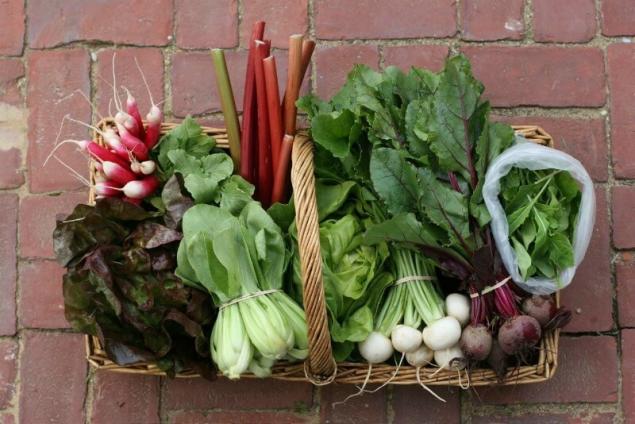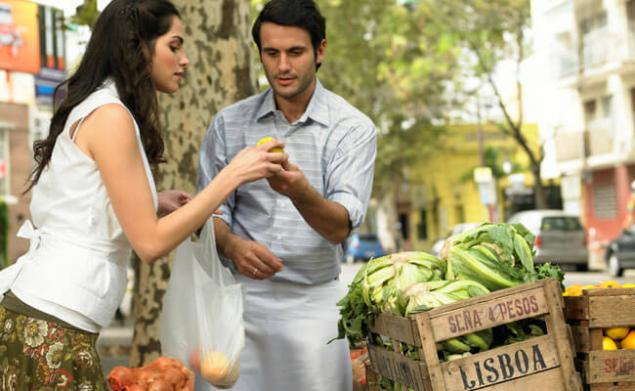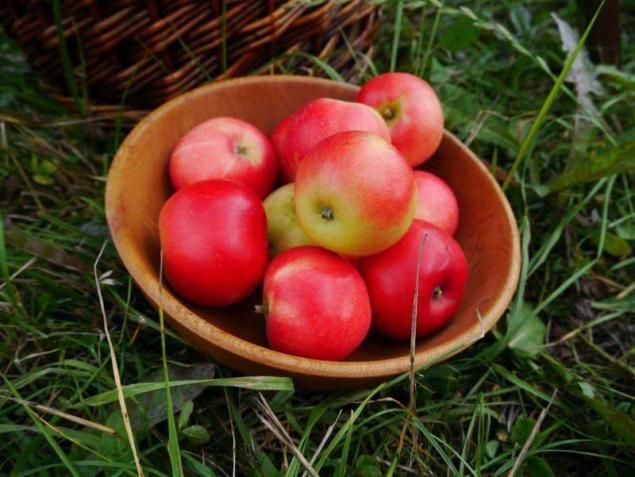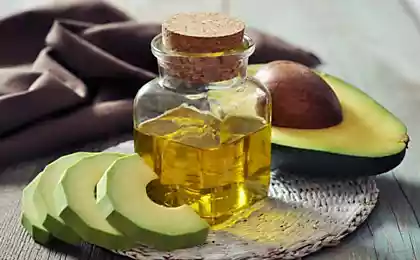416
Locavores: where was born — there and eat
Complex environmental, political and economic situation in the world encourages humanity to cooperate in the movement with good intentions: to protect, preserve, restore, turn back the clock.
Among humane food regimes – locavores, the principles of which I recommend to adopt to anyone who cares about not only their health, but also to the economy of the country. "Local wares" – for adherents of a healthy lifestyle and true patriots.

Locavores: Patriotic and ecological food
That cucumber from the garden healthier your pimply brother from the supermarket, known to everyone. According to the principles of locavores, cucumber from the garden is healthier avocado.
This in particular, and in General any seasonal local product is large and competitive advantages in comparison with any other product, delivered from the exotic far.
The official date of birth of the movement "local wares" – 2005. The authors of "Patriotic" of the power system is considered to be four American women from San Francisco who, for the sake of experiment, set out during the month not to use products delivered from other States. The food basket of the activists filled out to regional farms and found that this food not only positively affect the environment and the economy, but also revitalizes and slimming.
By 2007, the word locavores joined the vocabulary of the people, fundamentally and deliberately related to what is put in the mouth. My acquaintance with the fashion trend took place much later, in 2014.
Outgrew it in close intimate relationships? Not at all. Unfortunately or fortunately, my diet is still present Arabian coffee, Chinese tea, California almonds, Iranian raisins and other overseas delicacies.
How to become locavores: rules
Become locavores is not difficult. The transition to local products – the first and main step towards the improvement of body and prosperity of the regional economy.

Instruction:
1. Draw around his house a circle with a radius of 100-150 km, are delineated on site meet the farmers and become their honorary client of shopping – forget it.
2. If local and regional farming can't meet all your needs, carefully read the packaging – buckwheat is often made in China, pasta from Italian wheat, etc., collect information on local producers.
3. From the diet exclude tea, coffee, bananas and other exotic products (tea, use mint, lemon balm, chamomile).
4. Get a calendar of seasonal products, the tracking on it the time of appearance of fruit and vegetables in the market.
5. In bars and restaurants, order local beer and wine, torment the waiter, whose potatoes are so good roasted, etc..
6. 100% localista – it is a religion, do not go too far, 90% is more than enough, leave open the window to Europe (Asia, Africa, America), not to lose interest in the new and unknown.
Benefits of nutritional locavores:

They say we are genetically configured to eat the foods that our ancestors ate. Speak with plants and animals growing and living in the neighborhood, we have a lot in common. Unnatural for us food affects health, and the consequences can be very dramatic – from allergies of unknown etiology to cancer.
By the way, recently French scientists have discovered a curious fact: in the stomach of Japanese and seaweed share the same bacteria. Over the millennia, the consumption of sea food, the body delicately tuned in to its digestion and absorption. Express sushi restaurants Japanese, book in national institutions.
To be grateful to the Earth...
Localista, one way or another, permeated the life of every conscious person. Buying from grandmothers is an integral part of life of each of us. I am a proponent of the trade-offs (excluding consumption of products of slaughter origin).
The question, of course, controversial. But I'm sure that in the case of special needs the transition to the "Patriotic" food will not be a shock for me and horror. However, I would like to continue indulging in "harmful" habits.
Also interesting: the 3 rules of switching supply of living plant food
Leo Babauta: What to replace harmful foods in your diet
In conclusion, the question ist locavorism: what to do if you change permanent residence to move to another national cuisine and to expose the health risks from "non-genetic" power-or to remain true to the traditions and buy "genetic" products in a foreign country, knowing what they have overcome and what damage to the environment caused? published
P. S. And remember, only by changing their consumption — together we change the world! ©
Source: www.live4ever.ru/locavores.html
Among humane food regimes – locavores, the principles of which I recommend to adopt to anyone who cares about not only their health, but also to the economy of the country. "Local wares" – for adherents of a healthy lifestyle and true patriots.

Locavores: Patriotic and ecological food
That cucumber from the garden healthier your pimply brother from the supermarket, known to everyone. According to the principles of locavores, cucumber from the garden is healthier avocado.
This in particular, and in General any seasonal local product is large and competitive advantages in comparison with any other product, delivered from the exotic far.
The official date of birth of the movement "local wares" – 2005. The authors of "Patriotic" of the power system is considered to be four American women from San Francisco who, for the sake of experiment, set out during the month not to use products delivered from other States. The food basket of the activists filled out to regional farms and found that this food not only positively affect the environment and the economy, but also revitalizes and slimming.
By 2007, the word locavores joined the vocabulary of the people, fundamentally and deliberately related to what is put in the mouth. My acquaintance with the fashion trend took place much later, in 2014.
Outgrew it in close intimate relationships? Not at all. Unfortunately or fortunately, my diet is still present Arabian coffee, Chinese tea, California almonds, Iranian raisins and other overseas delicacies.
How to become locavores: rules
Become locavores is not difficult. The transition to local products – the first and main step towards the improvement of body and prosperity of the regional economy.

Instruction:
1. Draw around his house a circle with a radius of 100-150 km, are delineated on site meet the farmers and become their honorary client of shopping – forget it.
2. If local and regional farming can't meet all your needs, carefully read the packaging – buckwheat is often made in China, pasta from Italian wheat, etc., collect information on local producers.
3. From the diet exclude tea, coffee, bananas and other exotic products (tea, use mint, lemon balm, chamomile).
4. Get a calendar of seasonal products, the tracking on it the time of appearance of fruit and vegetables in the market.
5. In bars and restaurants, order local beer and wine, torment the waiter, whose potatoes are so good roasted, etc..
6. 100% localista – it is a religion, do not go too far, 90% is more than enough, leave open the window to Europe (Asia, Africa, America), not to lose interest in the new and unknown.
Benefits of nutritional locavores:
- you will automatically cease to use preservatives, dyes and other substances prolonging the shelf life and aesthetic appearance of the product;
- you are eco-conscious and care about the environment, because long transportation of food affects the planet and increases the "ecological footprint", which and without that terribly high;
- you not only support the local economy but also encourage the development of small farms;
- you are reviving the tradition of local cooking – brewing herbal tea, preparing pancakes;
- you enjoy the taste, get all the nutrients and save money.

They say we are genetically configured to eat the foods that our ancestors ate. Speak with plants and animals growing and living in the neighborhood, we have a lot in common. Unnatural for us food affects health, and the consequences can be very dramatic – from allergies of unknown etiology to cancer.
By the way, recently French scientists have discovered a curious fact: in the stomach of Japanese and seaweed share the same bacteria. Over the millennia, the consumption of sea food, the body delicately tuned in to its digestion and absorption. Express sushi restaurants Japanese, book in national institutions.
To be grateful to the Earth...
Localista, one way or another, permeated the life of every conscious person. Buying from grandmothers is an integral part of life of each of us. I am a proponent of the trade-offs (excluding consumption of products of slaughter origin).
- All that you can buy from the farmer I buy from the farmer.
- All that is required to please the subconscious (coffee, chocolate, pesto) acquire, void sumnyashesya, in the supermarket.
The question, of course, controversial. But I'm sure that in the case of special needs the transition to the "Patriotic" food will not be a shock for me and horror. However, I would like to continue indulging in "harmful" habits.
Also interesting: the 3 rules of switching supply of living plant food
Leo Babauta: What to replace harmful foods in your diet
In conclusion, the question ist locavorism: what to do if you change permanent residence to move to another national cuisine and to expose the health risks from "non-genetic" power-or to remain true to the traditions and buy "genetic" products in a foreign country, knowing what they have overcome and what damage to the environment caused? published
P. S. And remember, only by changing their consumption — together we change the world! ©
Source: www.live4ever.ru/locavores.html
The point of longevity: how to stop the aging process
Julia simultaneously: how to find the Golden mean between rigor and tolerance in the education























